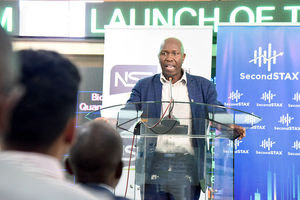How blockchain can transform Kenya's healthcare system

Blockchain is a digitally distributed, decentralised, public ledger that exists across a network.
What you need to know:
- A study by Frost & Sullivan estimates the global blockchain in the healthcare market will grow at a rate of 63.85 per cent from 2018 to 2025, reaching a market value of over Sh600 billion.
- The technology is estimated to save the industry up to Sh2 trillion yearly that goes to waste and theft by 2025.
When Nairobi-based healthtech startup AfyaRekod launched a fully automated universal patient blockchain portal last June, it cleared the uncharted path of blockchain-based innovations to transform Kenya’s healthcare system.
I have personally visited Kenya’s hospitals, both public and private, and despite the fact that many hospitals have joined the global drift to offer their services online, none has attempted to use blockchain to ease the lengthy verifications on patients, when for instance, a patient wants the costs to be covered by insurance. However, Kenya is now in the right direction towards this, first, because hospitals now acknowledge the value of digitising all patient medical data and keeping it private and secure. Blockchain is a decentralised system, meaning when a record is updated, it is approved by everyone on the ‘chain’, including health insurance providers, eliminating cases of incorrect data or tampering of patient data.
Along with artificial intelligence, doctors can have real time access to medical data history of patients, which help in making diagnosis faster and payments more efficient. A 2019 study by BMJ Quality & Safety shows that each year, over 12 million adults who seek outpatient medical care receive a misdiagnosis in the United States, a developed country. You can imagine what is happening in a developing country like Kenya.
The cases of surgeries being done on the wrong patient or wrong body organ you hear about arise from confusion of patient data and clinical medicine. Blockchain eliminates that.
This also means faster treatment of patients because insurers pay faster when they authenticate the data faster, putting an end to cases where hospital staff go through volumes of files and make several calls to insurance companies to clear the fees for a patient to undergo surgery.
With the help of the Internet of Things (IoT) and wearable devices to store and update valuable patient data such as blood pressure and sugar levels, blockchain helps doctors to track patients who are vulnerable to high risk and, if an emergency occurs, advise and alert their families. Now, you have read about a number of scandals in the Health ministry and other agencies such as Kenya Medical Supplies Authority (Kemsa) where those who benefited from corrupt schemes bragged how they used to pass by the Kemsa offices and become millionaires instantly. The same has happened at Kenya Medical Research Institute at the expense of tax-payer money. But if we had blockchain financial systems in the management of funds in these institutions, billions of shillings meant to transform Kenya’s health sector could be saved because fraud would not happen.
Think of the fake medicine from Kenya’s drug supply chain which bypasses the country’s taxman and standards regulator and gets stocked in various chemists. A blockchain software for procurement of medicine supplies would eradicate that.
Health and pharmaceutical authorities can only get rid of counterfeit medications using blockchain technologies because it enables the tracking and tracing of all medicines from the manufacturer to the shelves. It helps discover the cause of falsification. And then there is the imminent threat of cyber criminals that target hospitals. Their goal is usually to penetrate the IT system of a hospital, hack it and paralyse all operations and demand billions of shillings in ransom.
That would mean death of patients already in high dependency units. But if a hospital has a blockchain system to manage all operations, then that keeps hackers at bay because hacking it would require hacking everyone on the blockchain list - usually encrypted hashes of 32 characters per node or person.
A study by Frost & Sullivan estimates the global blockchain in the healthcare market will grow at a rate of 63.85 per cent from 2018 to 2025, reaching a market value of over Sh600 billion. The technology is estimated to save the industry up to Sh2 trillion yearly that goes to waste and theft by 2025. That shows it is the right technology for accountability in the management of health services delivery in Kenya and the ministries of Health and ICT should now consider the technology in advancing Kenya’s healthcare. Parliament should start thinking of making laws to govern the deployment of the technology in the country.
Dodhia is the CEO and co-founder of blockchain startup Savannah Labs. Email: [email protected]




